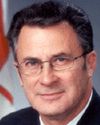Mr. Speaker, I welcome this opportunity to speak to Bill C-60, an act to establish the Canadian Food Inspection Agency.
First of all, I would like to congratulate the hon. member for Frontenac who did a tremendous job. He introduced a host of amendments to the bill which, as was to be expected from the hon. member, are based on common sense and the public interest.
Although the subject has not been widely publicized, it is a very important one that affects the daily lives of Canadians and Quebecers. The bill merges the inspection services of three departments, health, agriculture and fisheries, which from now on will be consolidated in one and the same agency that comes under the department of agriculture or the minister of agriculture.
This agency will have an annual budget of $300 million-this is big bucks-for three years and a staff of 3,400 employees. That being said, now for the bad news: the three entities that existed before had a total of 4,000 employees, so we are losing 600 inspectors. When we say $300 million, we must not forget that this reflects a budget cut of $44 million. So there is every reason to be concerned, but I will get back to that later.
The general position of the Bloc Quebecois on this issue is negative. We are against the principle of creating this agency, because we in the Bloc Quebecois consider that constitutionally, this is an area that comes under provincial jurisdiction, in Quebec and in the other provinces. So we are against the very entity that will be established by the Canadian Food Inspection Agency.
We are annoyed and concerned. Annoyed because considering the powers given to the minister by this bill, the minister will be able to appoint the chairperson, the deputy chair and all the members of the advisory board that will be created along with this agency. We are concerned because, as other members have already pointed out, this is a new patronage mill, and when we make this kind of remark to the government, it is clear we are referring to the patronage appointments made by the Liberal Party of Canada.
When we talk about patronage and the Liberal Party of Canada, we know what we are talking about, and so does everyone else. In Canada, in Quebec, for instance, returning officers, who play a very important role in our electoral process, are still appointed on an exclusively partisan basis. Nowadays we would have to look far and wide in Canada to find a returning officer without solid Liberal roots.
We had another example today, when a new lieutenant-governor was appointed, a lady who probably comes from a good family and has the qualifications. I know she was president of the Quebec Office des personnes handicapées, but all of the insiders know that her greatest qualification is, no doubt, having been a Liberal Party of Canada candidate in the past. So her appointment today as lieutenant-governor of Quebec is because of her good Liberal connections, and we can be pretty sure that there has been no great consultation with the Government of Quebec.
We had another example this morning, and another yesterday in my very own riding. It was announced, a bit prematurely because the official announcement had not been made, that the port of Trois-Rivières would be recognized as a Canadian port authority. And who was on the guest list? Two people who could not have been representing anything other than the Liberal Party of Canada. When it comes down to it, it is like an opening ceremony for a section of highway, a Cegep, a hospital or a CLSC in Quebec attended by a representative of the Parti Quebecois.
That is not how we do things in Quebec, not even, I think, how the Quebec Liberals do things. Here we have an imperialist mentality, Mr. Speaker, which you no doubt recognize. We must speak out against it, because it is such a primitive notion, as if the Canadian state belonged to the Liberal Party of Canada.
Returning to Bill C-60, the Canadian Food Inspection Agency and the powers assigned to the Minister of Agriculture, there are certainly grounds for annoyance here. We know that this is just one more den of patronage that has just been created by the Liberal government to which it can appoint its buddies. Justification for annoyance, justification for concern.
Concern, because, as has just been said, when food inspection services affecting the daily lives of Canadians and Quebecers are cut, when 600 inspector positions are cut, when $44 million are cut from services, one cannot help but be concerned about the quality of services that will be delivered throughout the country in future.
We are all the more concerned because there is a trend to privatization in an area as vulnerable as food inspection. According to what we hear, a new system has been developed, which may well take the place of the present system, if we are not careful, rather than complement the government system. That is very important.
According to our information, the inspectors could be in conflict of interest or the business could be in conflict of interest with itself. One wonders whether private funds are involved. If the owner of a slaughter house has to provide direct or indirect payment to the inspector supervising his production and if the inspector is pressured by his employer, where does his loyalty lie?
Whose interest is the inspector going to want to protect, the private interest or society's? His employer, who has power over him, or the public whose interest and health he is paid to protect?
With this sort of privatization, which is so fashionable, in the neo-liberal context of deregulation, we are dealing with a basic issue: people's health. I would be very happy to be in my own skin rather than the government's in the event of public health problems involving poisoning as the result of laziness or some sort of lack of control in which the interests of the employer and those of the public are in conflict.
To conclude, I would like to reiterate the concerns of the Union des producteurs agricoles. It has significant reservations regarding this bill. It would like to have people from the agricultural milieu who know what they are doing, who are capable of making the distinctions and recommendations required in food inspection, rather than masses of pals of the Liberal Party.
Furthermore, the Union des producteurs agricoles wants all the budgets-and this may not be easy with the $44 million cut-currently with health, agriculture and fisheries to be transferred. The three budgets should be combined, and not cut.
There is the danger of cost recovery. It underlies all of that. We hope all of this will not be done on the backs of farm producers, and it is the hope of the UPA as well.










